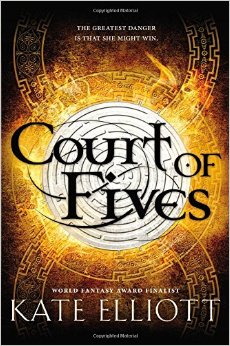Is it Better to Write a Series or…?
Saturday, October 15th, 2016 This is a short post for writers…although I’m sure readers have opinions too.
This is a short post for writers…although I’m sure readers have opinions too.
Recently on Twitter (where I spend far too much time) Kate Elliott, author of many excellent fantasy series, was asked an interesting question. Paraphrasing here: For a first novel is it better to write a stand-alone, a duology, or a trilogy?
Kate’s answer begins here and continues through a series of thoughtful tweets. I urge you to go read it:
Just over the last five years my answer to this question has changed due to the publishing shifts created by self publishing & ebooks. https://t.co/TG3I5IjTja
— Kate Elliott (@KateElliottSFF) October 14, 2016
I just wanted to add that there is one more alternative to consider: writing “related” novels…or, in a dark-humor vein, a “fake series.” This is how I started my novel writing career.
In a real trilogy — the Red Trilogy, for example — each successive book relies on the one that came before. In each book the writer ought to make an attempt to refresh the reader’s memory about past events, but it’s assumed the reader will be familiar with what went before, and that the story will build directly on that. There will also be an overall narrative arc that runs from book 1 to book 3 (or however many books are in the series).
But when it comes to traditional publishing, there are a couple of potential problems with writing a trilogy. First, if books one and two don’t do well in the market, book three may never be published. Consider that there are readers who won’t begin a trilogy until all the books are out. What happens if a large number of readers follow this strategy? Then very few copies of the first and/or second book will sell during those crucial early weeks after publication, and if that happens, there’s a good chance the publisher will simply cancel the series before it’s done.
The second problem was more crucial in the days before ebooks, but it can still affect a writer’s career today. This is when the publisher is willing to go ahead and publish all three books in a trilogy, but allows the first book in the trilogy to go out of print. Yes, really. It’s happened many, many times, and of course this means that the series is unlikely to win new readers, because the first book is unavailable to read. This is less of an issue in this age of ebooks, because ebooks are forever. But (so I’m told) a lot of readers still prefer print.
My response to this, in the days before ebooks, was to write “related novels.” In those days, books would go out of print fast — under a year in many cases. Knowing this, I made a decision to write my early novels as “stand alones.” So if we look at the Nanotech novels, all four share the same story world and some share characters, but each presents a complete story and can be read by itself. In fact, in their Bantam Spectra editions, the Nanotech books were never sold as a series. Over the years I’ve had readers tell me they picked up Vast first, read it, enjoyed it, and never suspected that there were three earlier novels they “should have” read first. That’s how a stand alone is supposed to work!
Anyway, writing “related” novels is one more strategy in the writer’s toolkit.







